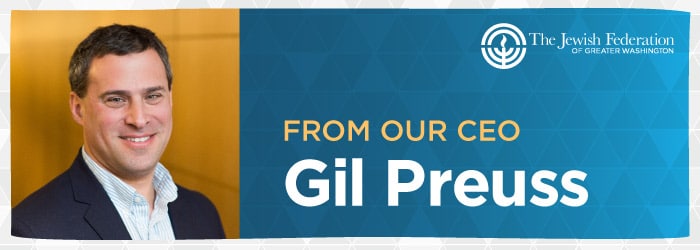-
03 January 2019

We are only a few days into the new year, and already I find myself wondering how the future will unfold. What iconic moments will make their way into our collective memory? In what ways will we learn and grow as individuals and as a community? How will history remember 2019?
No doubt, this era will be characterized in part by its division. While there have always been disagreements in our country and within our community, it seems more and more people are less and less willing to have any doubt about their own positions, judging all those with other opinions to be wrong if not unforgivable. At a time when we need to summon compassion and understanding, too many people are choosing to distance themselves from and express indifference to others. These dynamics are also affecting the Jewish community in significant and profound ways.
At the same time, however, I see a countervailing trend and tremendous bright spots. As national forces exert pressures to divide, there are many within the Jewish community who understand that we can and must stand together, even in our differences.
The Jewish tradition has a long history of discourse and debate over core communal challenges. The Talmud is full of them. Alternative views are always included within the text, showcasing debate across time and generations of rabbis. The Talmud highlights the need to not only express our own view but to articulate and understand the views of others as we search for truth. In fact, it is said that God sided with the House of Hillel over Shammai, “because the students of Hillel were kind and gracious. They taught their own ideas as well as the ideas from the students of Shammai. Furthermore, they even taught Shammai’s opinions first.” (Eruvin 13b:10-11).
Here in Greater Washington, people are carrying this tradition forward into 2019. Community members of all backgrounds are coming together to examine our divides and pave productive paths forward. They are approaching new ideas with curiosity and recognize that progress occurs by engaging with each other in thoughtful discourse. It is with this in mind that we invite you to join us on January 14, as we welcome Rabbi Dr. Donniel Hartman to lead a conversation about the relationship between Israel and World Jewries. This lecture is the latest offering in our partnership with the Shalom Hartman Institute of North America.
I also believe that the work we are doing to elevate our common needs, even as we acknowledge our differences, has the potential for national impact. In testing new mechanisms for exploring and addressing challenging issues, the Jewish community is serving as a model for American society. Indeed, across faith and other communities, people are seeking out ways to respectfully engage with others on sensitive and divisive topics. We are each strengthening our own conversations and laying the groundwork for compassionate discourse at the national level.
As a result, I predict that history will remember this time as a turning point. This is when the Jewish community—alongside fellow communities—came to understand the role we must play in repairing American civil society.
This is when we began an enduring effort to shrink the distances between us and set the wheels of positive change in motion.
Shabbat Shalom,
Gil
